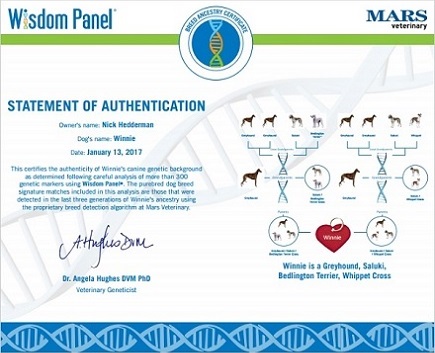
9 questions about your dog that a DNA test could answer!
Have you ever wondered what makes your dog tick? Considered paying an expert to help you understand your pet’s behavior? Fortunately, dog DNA testing provides a cost-effective alternative to professional consultation, and depending on the test you choose, the results can answer almost any question you might have about your dog!
To test your dog’s DNA, all you have to do is order a testing kit online and when it arrives, rub a swab against the inside of your dog’s cheek. The process is totally painless and after you return the sample to the lab, you’ll receive your dog’s results in an online account just a few weeks later.
If you’re already sold on the idea and you know what questions you want answered, take a look at our list of genetic pet testing companies to see what’s on offer!
If you’ve yet to make up your mind, here’s a list of 9 questions that a dog DNA test can answer…
1. What breed is my dog?

The approach of a fellow dog walker asking “What breed is your dog?” is an experience that I’m sure most dog owners are familiar with. For those with a purebred, this comes with a simple answer, but for many this can be a bit more complicated. “We think she’s some sort of terrier mix” I used to say, when the only evidence I had was that my dog slightly resembled a Jack Russell.
But why speculate when a DNA dog breed test can provide a conclusive answer? There are now a range of DNA dog tests available which can provide you with a comprehensive breakdown of the breeds that contribute to your pet’s DNA. Most companies that sell these genetic dog breed tests screen your dog’s DNA for markers associated with Kennel Club and/or American Kennel Club recognized breeds, which cover more than 200 types of dog. Not only do these provide (sometimes surprising) answers to those with mixed breed dogs, but they can also be used to confirm that purebreds are exclusively one breed.
Wisdom Panel and Embark are two of the most popular and comprehensive dog breed tests, though there are an increasing number available. Not only do dog breed tests provide you with details about the breed(s) of your dog, but they’ll sometimes include a family tree, showing information about your dog’s parents and grandparents (we’ll talk more about that in the next section). Genetic dog breed tests usually come with a certificate that details the breeds present in their DNA. So next time someone comes up to you asking “What breed is your dog?”, you can proudly reveal your answer.
2. Is my dog related to royalty?

Okay, so you might not find out if your pet is related to the Queen’s dogs, but taking a genetic dog test can provide you with your canine’s family tree. This will include the likely breed(s) of your dog’s ancestors going back to their grandparents and great grandparents, meaning you’ll potentially see information about 14 of your dog’s predecessors. These family trees can be useful and interesting for owners of both purebred and mixed breed dogs, as they clearly show a dog’s origins and can be used to confirm their pedigree.
If you buy a genetic dog test from Embark, you’ll also receive information about your dog’s deeper ancestry. This comes in the form of their maternal and paternal (male dogs only) haplogroups and haplotypes, which are codes that describe a group of dogs who share the same ancestor on their mother’s (maternal) or father’s (paternal) side of the family. Haplogroups and haplotypes can be used to show how your dog’s ancestors migrated across great distances over tens of thousands of years.
3. Have I made my dog this crazy or was he/she just born this way?

Whether your dog is a fluffy ball of energy or is more docile and well behaved, each has its own unique personality, and you may wonder how and why they display the characteristics they do. Genetic dog tests are not only able to tell you which breed(s) your dog is composed of, but they can predict their personality traits according to the outcome. ‘DNA My Dog’ is a test sold by companies such as International Biosciences and Who’z the Daddy?, and is a popular means of analyzing your dog’s DNA for this information.
I’m sure many of you will be able to recall moments when your dog seemed perfectly calm one second but was tearing around the house the next. This can be due to many things, but the mix of breeds in their DNA could be one reason. I found out that the reason my otherwise chronically lazy dog springs up as soon as the sun goes down is because she has ‘Lhasa Apso’ ancestors. Apparently, this type of dog was bred to alert Buddhist monks to intruders while they slept, so she must have inherited this trait! It was only by analyzing my dog’s DNA that I discovered this breed was in her mix, it would have been impossible to deduce from her physical characteristics alone.
4. What would my dog’s puppies look like?

It’s not only personality traits that can be revealed with a dog DNA kit. Some pet tests can give you an insight into the genetic variants responsible for the physical characteristics of your dog. If you have a mixed breed dog there may be several aspects of their appearance that you wonder about, and whether they’ll be passed on to your dog’s puppies.
If you have a purebred and you’re planning to cross it with another purebred, you may not think it worthwhile to test for the physical features their puppies may have. However, variations in features (e.g. coat color) can occur even when two pedigree dogs are crossed, and the only real way to know which features the puppies are likely to have is to test the DNA of both dogs. Paw Print Genetics offer these sorts of tests, and you can choose what you need based on the trait you’re looking for, or based on your dogs’ breeds.
5. Is my dog healthy?

The answer to this might seem obvious, but this isn’t just about your dog’s present health. We all hope that our pet will be healthy for as long as possible, but at some point most dogs will suffer from some sort of health problem. It’s horrible to think of your happy and healthy companion suffering from a condition, which is why many of us don’t actively seek to discover what our dogs may suffer from in the future. However, a genetic pet test can provide you with information that can help you to take a proactive approach towards your dog’s health.
By testing for the conditions that your dog’s breed(s) are predisposed to, genetic dog tests can tell you what you should look out for. The results of these tests will often come with advice to help you reduce any risks that are discovered, and they’ll potentially help you to prevent the condition from developing in the first place.
As well as the benefits to your dog’s health, genetic pet tests may also save you time and money in vet visits. It’s worth bearing in mind that most vets will prefer a particular type of genetic pet test if you’re considering one for your dog, so make sure you ask for their opinion next time you visit.
While most testing companies will test for the conditions that your dog’s breed(s) are susceptible to, some will simply test for the diseases that are equally common in all breeds. If there’s a particular dog DNA test that you’re interested in, we recommend you ask whether it’s a breed-specific or generic test before buying.
Test results will often come in a format that you can pass straight to your vet, which means you’ll be able to discuss anything concerning. The Disease Testing service from Paw Print Genetics provides tests for a range of diseases, which will be recommended according to your dog’s breed(s).
6. How will my dog react to drugs?

No, not on a big night out with their canine pals. We’re talking about the kind of drugs that are designed to make your dog better when they’re ill, but sometimes have the potential to make them much worse. For example, a fault in a gene known as multi-drug resistance 1 (MDR1) can cause dogs to react badly when treated with certain drugs.
Genetic dog tests for drug sensitivity can identify whether your dog has a fault in their drug resistance genes, allowing you and your vet to avoid any medicines that your pet might negatively react to. Drug sensitivity is tested for by both Wisdom Panel’s 4.0 test and Embark’s genetic dog test.
7. Is my dog a little on the heavy side?

Even the strictest of owners will find themselves tempted to treat their dog from time to time. Whether it’s a chicken scrap from a roast dinner or an extra treat for learning something new, we all find ourselves wanting to give in to their pleading eyes. But what if you’re concerned that your dog’s becoming a little more portly than is healthy? How do you find out if your dog is at a healthy weight without constant visits to the vet?
Yes, you guessed it – with a genetic dog test. The information that a dog DNA kit can provide about the breed(s) of your dog can also be used to estimate their ideal weight as a fully grown adult. Your dog’s gender and whether or not they’ve been spayed will also factor into this prediction, and so the testing company you buy from may ask you this when you order.
Wisdom Panel provide this information as part of their dog breed DNA analysis, so this would be a good test to buy if you’re worried that you need to be stricter with the titbits!
8. Is my dog secretly a wolf?

Wolves are well known for their disguises – Little Red Riding Hood’s grandma and sheep being two renowned examples – so perhaps your dog’s been posing as a wolf all these years?
Joking aside, many dogs have lupine ancestry and possess the wolfish traits of their forbears. If you’d like to know the extent to which your dog is related to this sub-species (dogs and wolves are actually the same species), then a dog DNA test can answer this question…
DNA My Dog offers a dog DNA kit specifically designed to find out how much wolf (as well as fox and coyote) DNA your dog possesses. Most dogs are up to 1% wolfish but if your pet is a Shih Tzu or a Chow Chow, then they’re much more likely to possess wolf DNA than average, even though it can be argued that German Shepherds and Huskies look much more wolf-like!
9. Who’s the puppy daddy?

Has anyone ever claimed that your dog’s sired an unwanted puppy? Or perhaps you have doubts about the parentage of a dog that you’re buying or selling? These sorts of concerns can be super stressful, especially if you’re a breeder and your reputation depends on proof of parentage.
Fortunately, this doesn’t need to be the case. One of the simplest and most reliable types of pet DNA test are those that determine the parentage of your dog. So-called ‘dog paternity tests’ can be used to disprove parentage with 100% accuracy and to prove parentage with upwards of 99.99% accuracy. Depending on what you want to know, you’ll usually have the option to test the puppy and the alleged sire, or the puppy and both alleged parents.
This type of pet test is offered by many dog DNA testing companies, but BioPet Laboratories stands out as they include your dog’s DNA profile in the results. The profile is then stored in the ‘DNA World Pet Registry’ so you can compare it with that of another dog in case of future parentage disputes, without having to swab your dog a second time.

Ashley Sager
May 31, 2017
if you want to know dog breed you just need to take dogs blood sample and you can just test it through DNA Testing Kit. Few days back i was thinking to buy a dog’s DNA kit, as i was searching, i got some important details. There are various options available to buy, which are Wisdom Panel, Mars Veterinary, Wisdom Panel Mixed Breed, Embark Dog & Canine Breed Identification Test kit to know which type of exact breed it is.